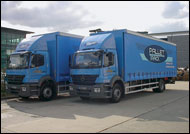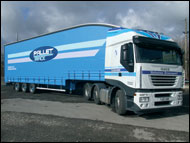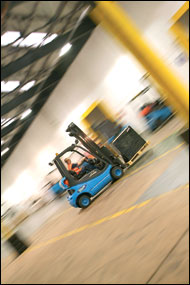 Pallet-Track is the UK’s fastest growing overnight palletised freight distribution network. A shareholder system, Pallet-Track Ltd was formed in 2002 and went live with 46 members on 30th January 2004, transacting 852 pallets through its Wednesbury hub, a UK record volume of freight for a first night’s operation. Since then Pallet-Track’s throughput has grown fivefold and now, in its fifth year, it transacts an average 4,500 pallets per night between the current 65 member depots at the central hub. To date Pallet-Track has handled over 2 million pallets and boasts a zero lost pallet record! Nigel Parkes, Pallet-Track’s Managing Director, and Andrew Spencer, the Sales & Marketing Director, spoke to Warehouse & Logistics News.
Pallet-Track is the UK’s fastest growing overnight palletised freight distribution network. A shareholder system, Pallet-Track Ltd was formed in 2002 and went live with 46 members on 30th January 2004, transacting 852 pallets through its Wednesbury hub, a UK record volume of freight for a first night’s operation. Since then Pallet-Track’s throughput has grown fivefold and now, in its fifth year, it transacts an average 4,500 pallets per night between the current 65 member depots at the central hub. To date Pallet-Track has handled over 2 million pallets and boasts a zero lost pallet record! Nigel Parkes, Pallet-Track’s Managing Director, and Andrew Spencer, the Sales & Marketing Director, spoke to Warehouse & Logistics News.
Warehouse & Logistics News – Is Pallet-Track still Britain’s newest pallet network? Where do you rank among the networks in size and other measurements?
Nigel – Pallet-Track remains the latest entrant in our industry. Two new networks entered the market in 2006 and 2007 respectively, but failed early on. With no official figures released outside any network we cannot comment accurately on our size ranking amongst our competitors, but we have grown astonishingly in four short years, and eclipse some of our rivals in volume. That said, volume of freight isn’t everything; quality of service matters most.
WLN – What is your proposition for the end user? How important is Pallet-Track membership to end users in choosing a haulier for their pallets?
Nigel – We firmly believe in constant innovation and a strong association between our members and the hub, resulting in a ‘best in class’ policy. Shippers of palletised goods are now much more aware of their local haulier’s association with a pallet network, and want to benefit from the latest technology as used by the networks.
WLN – What are the benefits to end users of sending their pallets through your network?
Nigel – Added value services like Track and Trace and POD’s visible on-line are now pre-requisites for any shipper. PT has had this technology since inception, but we have recently continued to develop and launch enhancements such as a customer on-line consignment entry and status system, which eases end of day administration for both shipper and local depot. A fully licensed postcode gazetteer, central insurance and most recently an independent audit team to oversee our entire sort operation are just some of the projects to come to fruition of late.
 WLN – How fast is Pallet-Track growing?
WLN – How fast is Pallet-Track growing?
Andrew – We’ve grown 37% in our last financial year ending January 31. We’ve added 13 new members in the past 12 months, consolidating additional (secondary) postcode areas already serviced by our members, enhancing our ‘closer to the customer’ policy of continued network growth. We have recruited accordingly, both FLT operatives and supervisors and management for night and day operations and administration.
WLN – How much have you invested on all that?
Nigel – It’s difficult to quote a figure, however we believe strongly in investing in our people, who provide our high levels of customer service. Our business is our service: our people reflect its quality.
WLN – Who owns Pallet-Track?
Nigel – Our financial structure is a combination of private equity and shareholders, which we believe contributes to the best all round association between our members’ individual interests and those of the network overall.
WLN – Going back to the beginning, what prompted Pallet-Track’s formation?
Nigel – Armed with experience from both parcel and pallet networks, it was decided there was an opportunity to enter the industry with a different approach to customer service and IT.
WLN – What say do the other members have in Pallet-Track policy?
Nigel – The membership democratically elects a network director each year to sit on the PT board and act in their interests. This person has full visibility of every aspect of the limited company’s running.
WLN – Can all the UK’s pallet networks survive the next few months?
Nigel – This is a question often asked of us and our competitors. Again, we concentrate solely on our goals and objectives rather than the competition’s activities. It was clear that there was little opportunity for a new network in the recent past, but to say one may go may be a little presumptuous! 2008 will be difficult, I’m sure, for everyone. We’ll cope with an uncertain economic future by maintaining our excellent progress to date and commitment to quality.
WLN – Who’s on the PT board?
Nigel – The board comprises six directors, four full-time on-site, covering managing, administration, sales and finance, plus the network director and Chairman, both non-executive officers.
WLN – What support do you offer members?
Andrew – PT has active field support for all aspects of the business, including new depot induction and ongoing training in operational and administrative practises. In 2006 we started a national sales programme, providing sales support to members. This team will increase to 5 full-time hub employed staff during 2008.
WLN – How big is your Wednesbury hub?
Nigel – Our footprint is nearly 200,000 square feet, 115,000 of which are operational workspace. We employ 60 full-time employees.
 WLN – What are your peak operating periods?
WLN – What are your peak operating periods?
Andrew – Our peak times have changed over recent years. In the past we have always been very busy at Easter and the ‘back-end’ of the year, from September to December. However with an early Easter this year the anticipated volume didn’t materialise until April, when we recorded our busiest night to date, with just over 5,000 pallets.
WLN – How much more capacity is there for growth? Any plans for more hubs?
Nigel – If you asked me if we could handle 4,000 pallets each night in our current hub when we were handling 3,000, I would have said probably not! However with recent operational changes in respect of regionalising the hub and creating ‘drop zones’, we have transformed our efficiency and can easily deal with over 4,000 pallets. In respect of satellite hubs, we have not at present considered this. We have very strong members in regions where other hubs have corporate depots, so we don’t see the need to destabilise any relationships there.
WLN – Are your members’ trucks branded Pallet-Track?
Andrew – We have fantastic corporate identity. We believe this is, again, down to the shareholder relationship; rather than being pushed into carrying a corporate brand, members do so willingly through the joint association.
WLN – Do you cover the whole UK? Do you have links with overseas pallet networks?
Nigel – We started with, and continue to have, full UK coverage. For the last three years we have been working jointly with our members on consolidation of areas by realising secondary postcodes to enable new members to join and thus strengthen us overall. We have associations with another network in Germany, and have major plans regarding Europe in the near future.
WLN – Are you looking for more new members?
Andrew – The availability of areas for potential new members has reduced greatly over the last three years, as we have taken on over 25 new members in that time. However if circumstances present themselves and secondary area availability is apparent, we will look to progress discussions with reputable companies.
WLN – How do you vet members and monitor performance? Have you ever had to sack a member?
Nigel – We have strict pre-start criteria for companies looking to join the network. Thereafter we continually monitor through various audit areas in relation to operational, administrative and financial practices. We have only had to ‘ask’ two members to leave in four years, and we are delighted that no one member has left of their own free will to join a competitor network.
WLN – Given your name ‘Pallet-Track,’ are your Pallet-Tracking systems any more sophisticated than other people’s? Do you offer on-line Proof of Delivery? When do pallets become visible on the network to members?
Nigel – You’re right, the name ‘Pallet-Track’ was a direct reference to our superior tracking systems, which we introduced at the start. The first scan happens when the freight leaves our collecting members’ premises in the early evening; the second takes place on arrival at the hub. The third scan is when the trunk vehicle is loaded for return to the depot, and the fourth and last scan takes place upon receipt at the depot. We have had POD’s on-line since we began. All scans and POD’s are visible throughout for our members and their customers.
WLN – You’ve never lost a pallet. Do other networks lose them regularly? What do you do to prevent it?
Nigel – We are very proud of our zero lost pallet record, but I cannot comment on our competitors! I believe this record is due to our attention to detail, driven through our IT processes from collection to delivery, and our checking and operational process at the hub.
WLN – What quality control systems do you have at the Wednesbury hub? How have they been enhanced in the past year?
Nigel – We believe our QC process was excellent anyway, but decided this year to achieve even better benchmarking of our processes. As our product is service and we expect each member vehicle to arrive with us in a good condition to achieve an efficient ‘sort’, we identified that to counter the loss of the line haul drivers’ ability to check re-loaded vehicles we would introduce an independent team to monitor our operatives’ quality and performance. This is working very well, with a reporting platform directly to day operations, overseen by myself.
WLN – What percentage of the price of sending a pallet through the network is retained at the centre? How does that compare with other networks?
Andrew – Like most other networks, Pallet-Track has a controlled members’ rate schedule, identifying fixed pricing into every UK and European postcode. The hub does not retain any of this cost; it has a two-tier (day and night) fee for transhipment that is competitive within the industry.
WLN – What different service options do you provide? Which of these represents the biggest proportion of your business?
Andrew – We provide all expected service criteria, based around and complimenting both a Next Day (24-hour) and Economy (48-hour) service. Premium options such as AM, Timed delivery, tail-lift and book in are extended through the rate schedule. Typically we have a 70/30% split in volume between Next Day and Economy.
WLN – Do you carry chilled or frozen food? What about high value freight or hazardous goods? Are there any goods you won’t carry? Do you only carry palletised freight?
Nigel – We do not handle any food produce other than ambient, and do not carry dangerous or hazardous goods. All freight received through the network must be palletised. It was a consideration pre-start to provide a specialist controlled service for high value goods. However with our processes, which are robust and fully controlled, we do not see a need to initiate this, as we treat every product as special.
WLN – What is your maximum transit insurance cover?
Nigel – We work to standard RHA terms and conditions, with increased liability of £5,000 per metric tonne.
WLN – Who are your members’ end users – what size companies, in which sectors? Do you work with the 3PLs? Do you have any national accounts such as retailers or manufacturers, whose supply chains you run for them?
Andrew – Our end users range across a wide and diverse base of consignee. Predominantly B2B and holding less stock holding than previously but more so than ‘Just-in-time’, our consignees are SMEs to large multi-national organisations. We currently have no 3PL associations or corporate accounts. We believe firmly in the ‘local’ ethic, however with our future plans for the central facility we will not discount potential associations with larger organisations that benefit the network overall.
 WLN – What warehousing and storage capacity do you have?
WLN – What warehousing and storage capacity do you have?
Andrew – At present we don’t offer any on-site storage, however we have major plans in respect of re-location which will enable us to provide storage to members or their clients from both a hub and a remote facility.
WLN – What trade associations are you members of?
Andrew – Pallet-Track has been a member of the Association of Pallet Networks since its inception in October 2006. Pallet-Track has supported the APN in the introduction of a Health & Safety Forum and more recently in benchmarking the sector by providing key statistics in terms of both central and field activities.
Nigel – We actively support the APN in raising the awareness of our sector, with the hope that a better understanding can be gained about our industry resulting in joint initiatives to the benefit of all.
WLN – Have you won any awards for innovation or other achievements?
Andrew – Pallet-Track was the only pallet network shortlisted in the inaugural ‘Network of the Year’ category at the 2007 Motor Transport Awards. Although ultimately not winning, we were proud of our achievement in representing the industry in the final four.
WLN – What do you see as the most important external factors affecting the UK pallet network business?
Nigel – The main drivers are fuel prices, road pricing, congestion charging and skills shortages, which all strengthen the argument for companies to use pallet networks for their freight instead of their own transport. Pallet networks are renowned for being efficient by virtue of their concept, and there’s little or no redundancy in terms of empty vehicles.
WLN – Have you seen any signs of an economic downturn in your business this year?
Nigel – Quite frankly, we’ve seen none at all, which we’ve been surprised about. Our April peak demonstrated this significantly. Having said that, we are at the ‘urgent’ end and our role is to respond with resources. We’re seeing continued confidence from our members, and a sustained level of enquiries.
WLN – Do you expect the new Mayor of London will make any difference to the transport situation in the capital – will the Low Emission Zone and Congestion Zone regulations stay the same under Boris?
Nigel – From talking to our Central London member, one of the new Mayor’s policies is a commitment not to extend the Congestion Charge to the Low Emission Zone boundary. That’s the policy that will affect us directly.
WLN – Finally, where do you see Pallet-Track going from here?
Nigel – Like any industry, our market has matured over the years: unlike manufacturers, our product is service. We plan to continue, and with most hauliers now in a network, it will become more of a market share discussion. Our focus is on keeping our quality benchmark in place and providing the best possible service. It’s a vibrant, exciting business: we’re always looking at new developments and aren’t frightened about introducing new strategies such as quality control. Forecasts are difficult, but we’re constantly looking at strengthening our numbers and investing in members’ sales support. We’re very pleased with our development over the last four years, and will continue in this direction by further investing in and re-evaluating our quality.




Comments are closed.